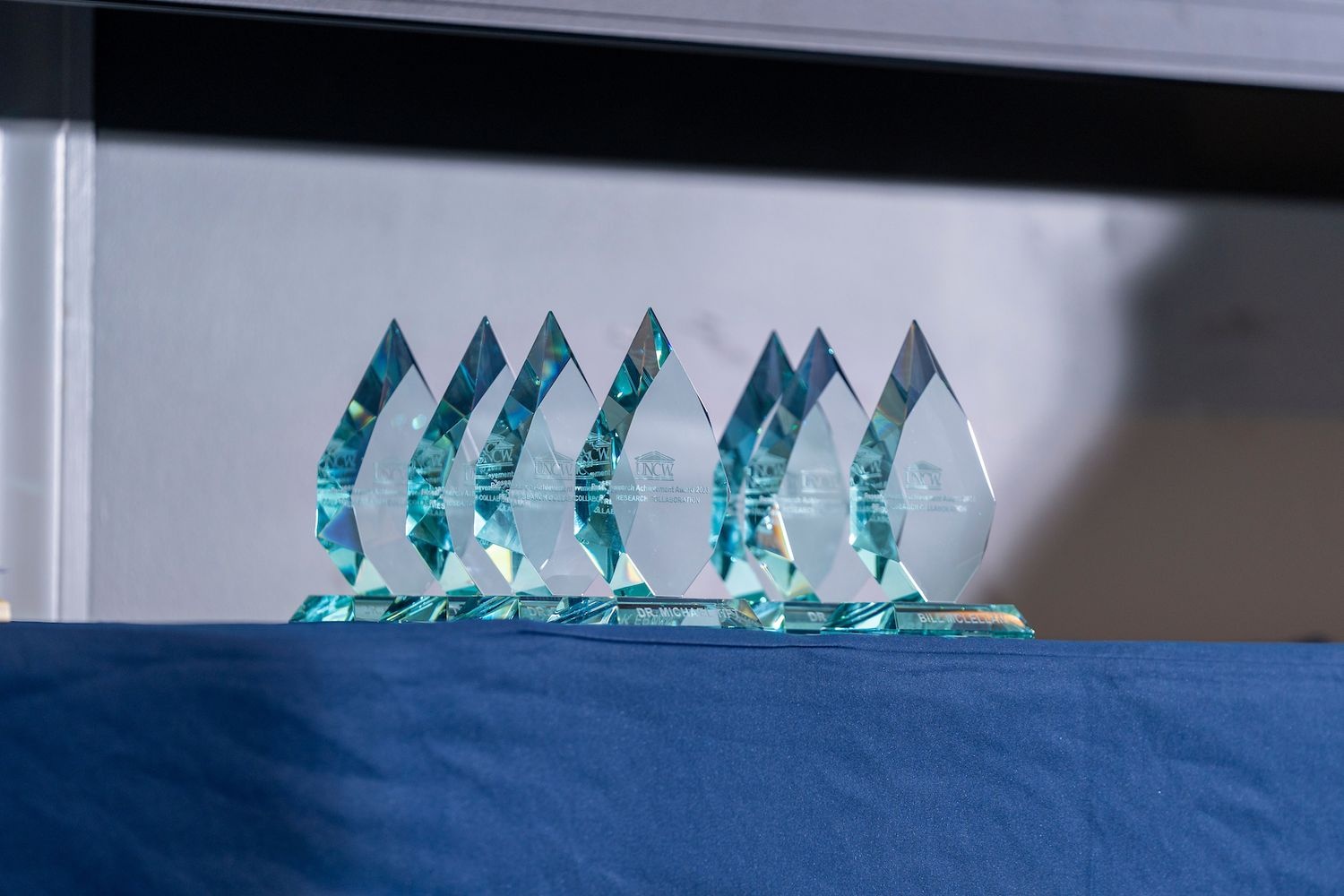
Photo: MichaelSpencer/UNCW
Eight faculty researchers have been named recipients of the 2025 Research Achievement Awards in recognition of their excellence in research, innovation and scholarship. The awards honor significant contributions to advancing knowledge, discoveries with broad societal impact and the meaningful engagement of students in the research process.
The honorees include five individual recipients of the Rising Research Excellence Award:
- G. Edzordzi Agbozo, English
- Sarah Gaby, Sociology and Criminology
- E. Britt Moore, Environmental Sciences
- Menaka Raguparan, Sociology and Criminology
- Bradley Tolar, Biology and Marine Biology
A team of three also earned the Research Collaboration Award:
- Nathan Crowe, History
- Nicole Fogarty, Biology and Marine Biology
- Jacob Warner, Biology and Marine Biology
Collectively, the awardees represent five departments across the College of Humanities, Social Sciences and the Arts and the College of Science and Engineering.
Below is further information on the 2025 Research Achievement Award recipients.
G. Edzordzi Agbozo, English
Agbozo’s research examines the rhetorical dynamics that shape how health and illness are understood in an increasingly interconnected world. By investigating discourses around medicine, health crises and health technologies, the work explores how these narratives influence public perception, policy decisions and health practices across borders.
“My research program contributes to a deeper understanding of how health communication impacts real-world outcomes in medicine, public health and policy.”
Sarah Gaby, Sociology and Criminology
Gaby’s research examines how historical context shapes contemporary social outcomes. Her research program will continue to grow by integrating community partners and building momentum for the growing subfield.
“My work informs the way we understand contemporary social problems by establishing and reinforcing the role of historical context in constructing present outcomes.”
E. Britt Moore, Environmental Sciences
Moore’s research explores soil-plant-water interactions to develop accessible, low-cost toolkits that support soil health and facilitate environmental remediation.
“Understanding soil processes helps us combat food and water scarcity and also helps us address other environmental challenges that adversely impact human health.”
Menaka Raguparan, Sociology and Criminology
Raguparan’s current research examines how sex work and sex trafficking are problematically conflated in popular discourse and policy. It analyzes how moral, political and legal rhetoric is used to frame sex work as a social problem, particularly through state responses that invoke trafficking language.
“By centering marginalized and stigmatized voices, my research serves as a platform to amplify their lived realities. Additionally, my work aims to destigmatize and decriminalize sex work.”
Bradley Tolar, Biology and Marine Biology
Tolar’s research in aquatic environmental microbiology focuses on the Archaea, an understudied group of microorganisms that are key players in the global nitrogen cycle. His lab investigates how these archaea change over space and time within our local ecosystems, including rivers, estuaries, coastal ocean and out into the Gulf Stream.
“My research seeks to understand how microbial processes are impacted by changing environments, both by looking at specific organisms and monitoring whole ecosystem dynamics. This coupled strategy allows for connections to other elemental cycles, trophic levels and ecosystems to better predict how ecosystems will function in the future.”
Genetically Engineered Coral
Nathan Crowe, History; Nicole Fogarty, Biology and Marine Biology; Jacob Warner, Biology and Marine Biology
Their interdisciplinary research seeks to genetically modify corals to resist climate change with the goal of involving international stakeholders to implement novel techniques in coral restoration.
“Coral reefs are a critical worldwide resource. Advances in coral reef restoration will have reverberating impacts around the world.”
The group will be formally applauded at the 18th annual Research Reception in September. For more information on the Research Achievement Awards and to view past recipients, visit the Research & Innovation Awards & Recognition page.
This article has the following tags: UNCW News Homepage Innovation & Discovery Accomplishments Awards & Grants Engagement Research & Innovation Area


